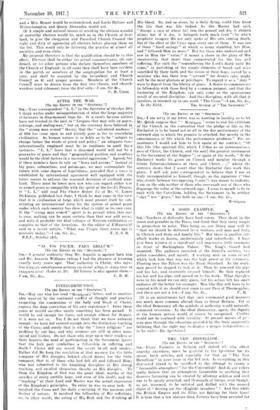AFTER THE WAR.
[To THE ED7701 or rue " Sescreme."1 Sts,—Your correspondent "L. L." in the Spectator of October 20th 1 think writes under misapprehension of what the large majority of believers in disarmament hope for. It is surely because nations have not trusted in the past to " Leogues that may rely on paper, red-tape, end sealing-wax," but on the contrary have believed in the " strong man armed" theory; that the " calculated madness" of 1914 has come upon us and already gone so far to overwhelm civilization. As human nature is so fickle as to he " subject to change before the winds of greed and policy," an adequate force Internationally employed must be in readiness to quell them instincts. "L. I.." fears that a disarmed world will not be a guarantee of peace and that "geographical position and Itemisers would be the chief factors in a successful aggression." Agreed, het if these numbers have to rely on "bows and arrows" instead of big guns, submarines, and poison-gas, we may contemplate the future with some degree of hopefulness, provided that a force is established by international agreement well equipped with the latter means to enforce the reasoned decisions of civilized man- kind. There must be fewer men now who can regard either nor or armed pence as compatible with the spirit of the Lord's Prayer. If "I,. L." will read The Choice Before Cr of Mr. O. Lanes Dickinson, published- last June, I think he may come to the view that it is civilization at large which ntust protect itself by sub- stituting an international force for the system of armed peace under which each country has done what is right in its own ryes. If the "strong man armed" spirit is to prevail when this war is over, nothing can be more certain than that war will recur, and with it probably the final collapse of Western civilization to complete as that of the Assyrians. As the editor of LW/man:Id said in a recent article, "What was Utopia three years ago is


































 Previous page
Previous page